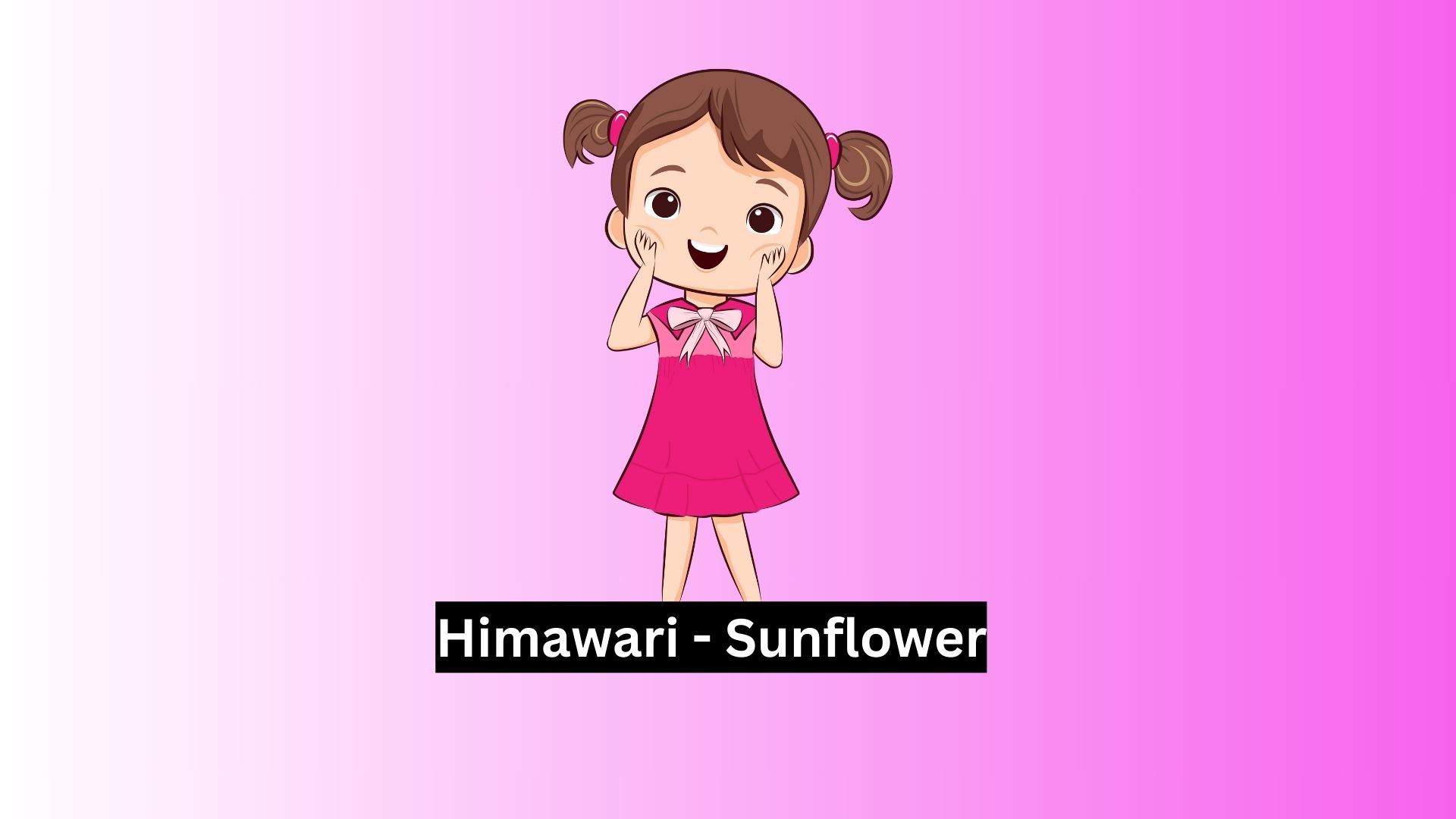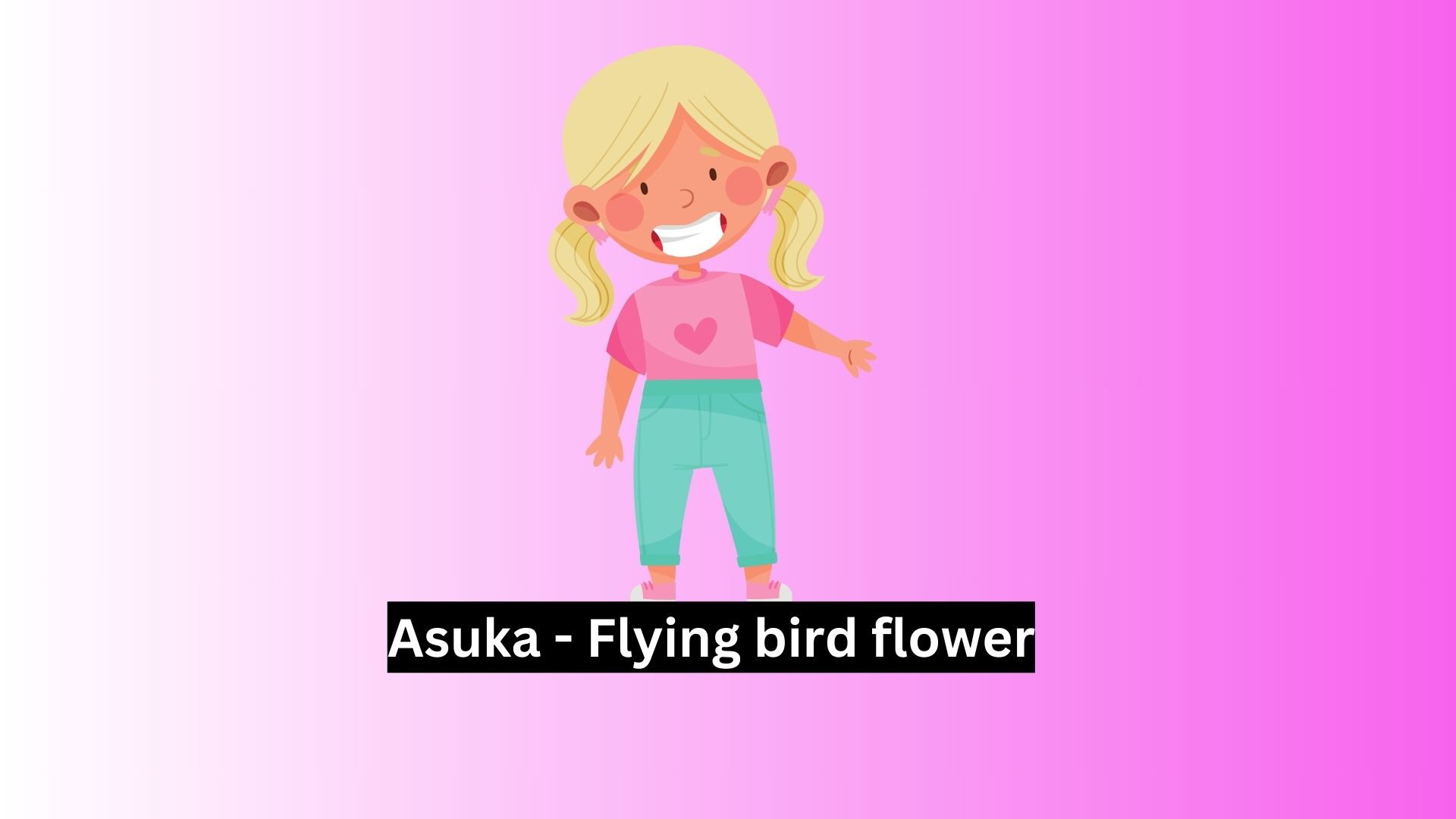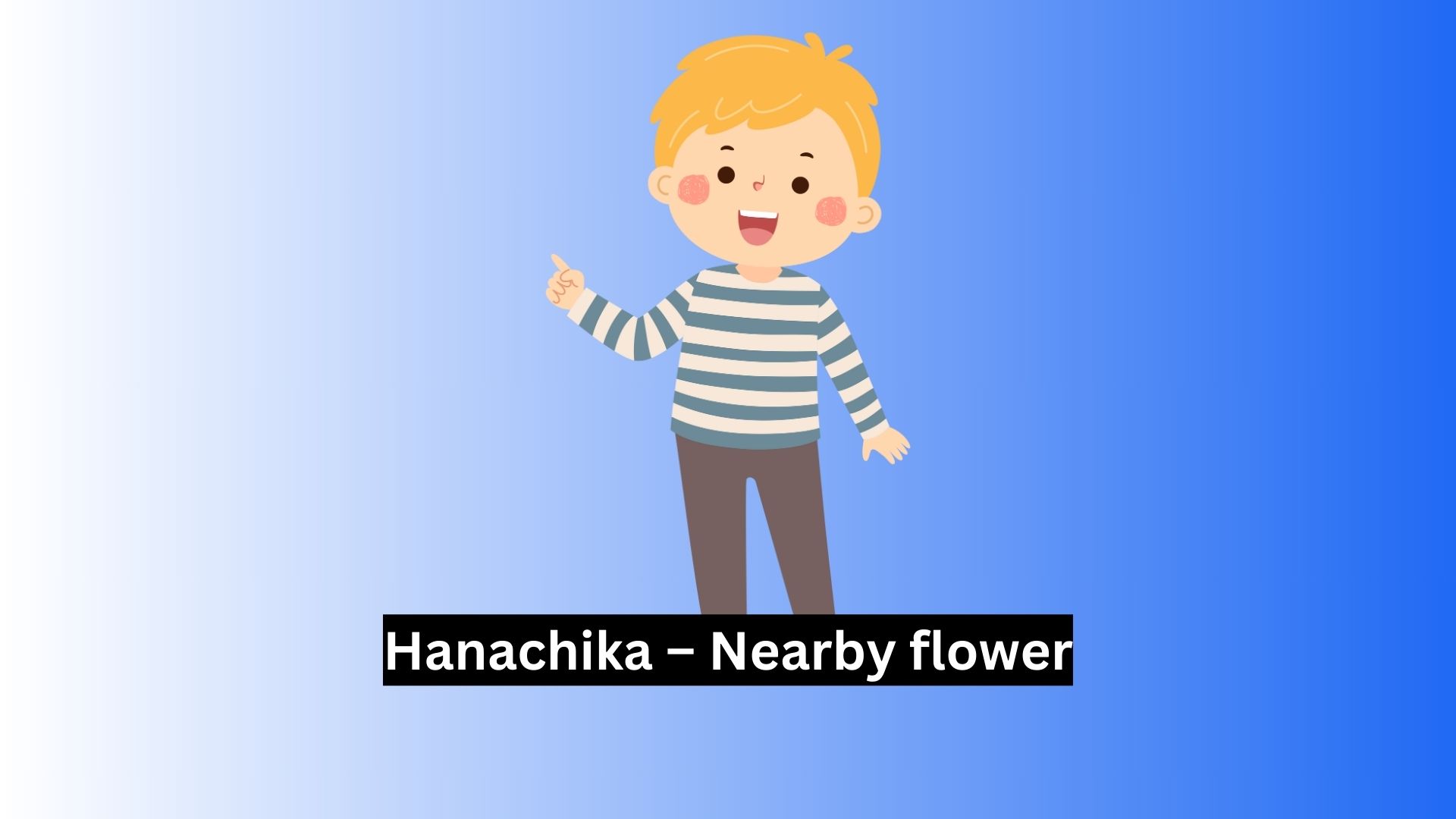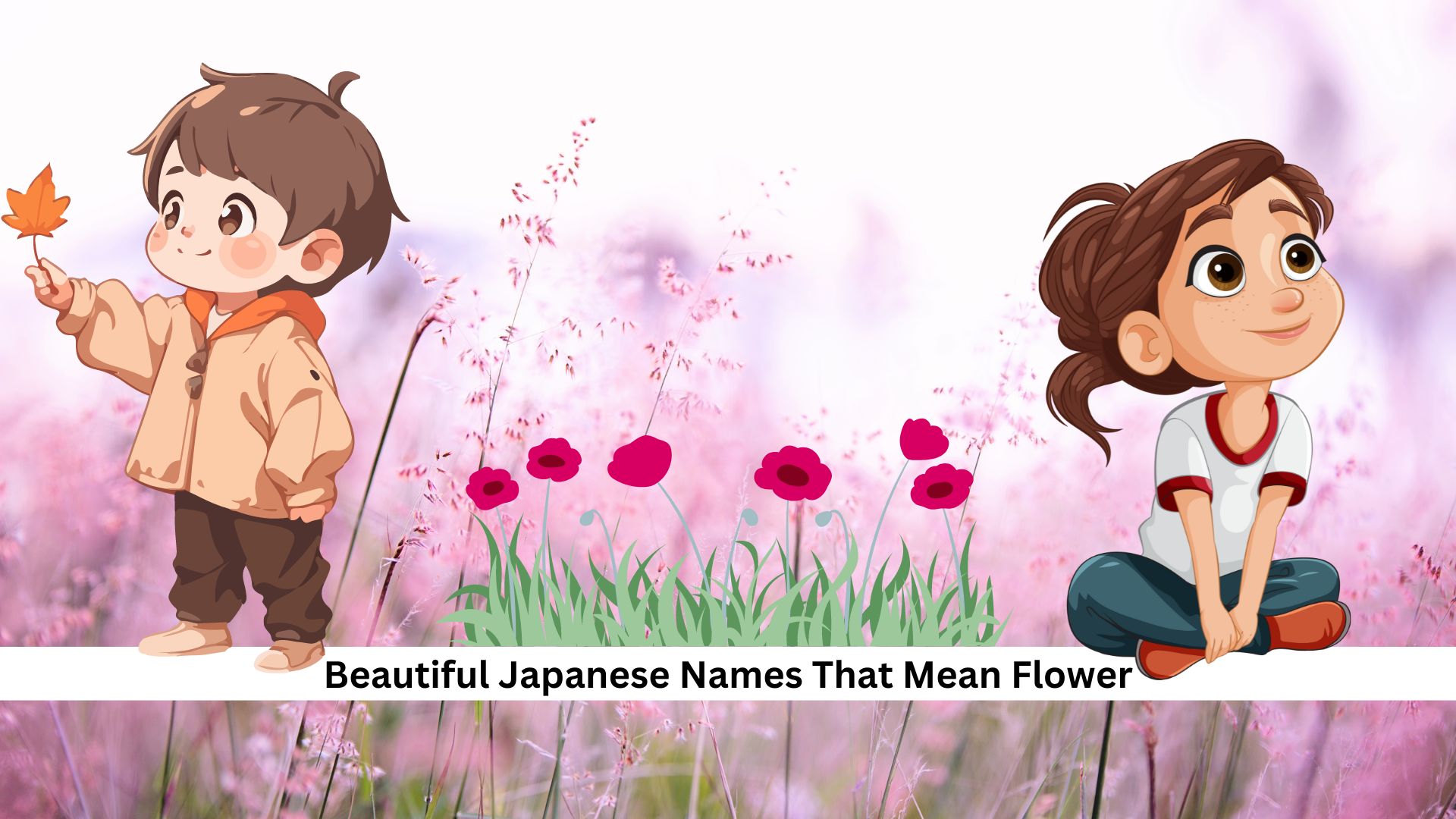Exploring Japanese names that mean flower is like opening the door to a colorful blend of culture, language, and nature. These names, from Sakura and Hana to Kiku and Ren, do more than just identify a person. When you look into these names, you get a real sense of what Japanese culture values, especially their love for living in harmony with nature.
By diving into what these floral names mean, you start to see how they shape a person’s identity and values. Let’s chat more about how these names are more than just a way to call someone, but a way to connect them deeply with their culture and surroundings.
Japanese Names That Mean Flower for Girls
Japanese girl names inspired by flowers are not just pretty; they hold deep meanings. These names show a strong love for nature and beauty, which is very important in Japanese culture.
Take ‘Sakura,’ which means cherry blossom. This flower is a big deal in Japan, symbolizing the beauty of life and how quickly it can pass. Then there’s ‘Hana,’ which simply means flower. Each name connects to Hanakotoba, or the language of flowers, a unique way of sharing feelings and messages through flowers.
- Hana (花) – “Flower,” directly means flower, representing beauty and nature.
- Sakura (桜) – “Cherry blossom,” directly means cherry blossom, symbolizing the iconic springtime flower.
- Yuri (百合) – “Lily,” directly means lily, representing elegance and purity.
- Ayame (菖蒲) – “Iris,” directly means iris, symbolizing a colorful and beautiful flower.
- Ran (蘭) – “Orchid,” directly means orchid, representing a delicate and exotic flower.
- Sumire (菫) – “Violet,” directly means violet, symbolizing the small and vibrant flower.
- Tsubaki (椿) – “Camellia,” directly means camellia, representing the striking and lovely flower.
- Asagao (朝顔) – “Morning glory,” directly means morning glory, symbolizing the flower that blooms in the morning.
- Botan (牡丹) – “Peony,” directly means peony, representing the lush and fragrant flower.
- Fuji (藤) – “Wisteria,” directly means wisteria, symbolizing the cascading purple flowers.
- Kiku (菊) – “Chrysanthemum,” directly means chrysanthemum, representing the traditional and revered flower.
- Nadeshiko (撫子) – “Pink carnation,” directly means pink carnation, symbolizing the pretty and resilient flower.
- Ren (蓮) – “Lotus,” directly means lotus, representing the sacred and beautiful water flower.
- Suiren (睡蓮) – “Water lily,” directly means water lily, symbolizing the serene and floating flower.
- Azami (薊) – “Thistle,” directly means thistle, representing the tough and spiky flower.
- Himawari (向日葵) – “Sunflower,” directly means sunflower, symbolizing the bright and cheerful flower.

- Kaede (楓) – “Maple,” symbolizing the beautiful autumn leaves, often associated with nature’s beauty.
- Momo (桃) – “Peach blossom,” directly means peach blossom, representing the delicate spring flower.
- Rindo (竜胆) – “Gentian,” directly means gentian, symbolizing the vibrant and hardy flower.
- Ume (梅) – “Plum blossom,” directly means plum blossom, representing the early spring flower.
- Ajisai (紫陽花) – “Hydrangea,” directly means hydrangea, symbolizing the colorful and lush flower.
- Aoi (葵) – “Hollyhock,” directly means hollyhock, representing the tall and stately flower.
- Bara (薔薇) – “Rose,” directly means rose, symbolizing the classic and romantic flower.
- Kozakura (小桜) – “Small cherry blossom,” directly means small cherry blossom, representing the tiny and delicate flower.
- Nanohana (菜の花) – “Rapeseed blossom,” directly means rapeseed blossom, symbolizing the bright yellow flowers.
- Oki (桜) – “Cherry blossom,” representing the beautiful and iconic flower.
- Ruri (瑠璃) – “Forget-me-not,” directly means forget-me-not, symbolizing the small and memorable flower.
- Satsuki (皐月) – “Azalea,” directly means azalea, representing the vibrant and abundant spring flower.
- Shiragiku (白菊) – “White chrysanthemum,” directly means white chrysanthemum, symbolizing the pure and elegant flower.
- Tsutsuji (躑躅) – “Azalea,” directly means azalea, representing the colorful and prolific spring flower.
- Akane (茜) – “Madder flower,” directly means madder flower, symbolizing the plant used for red dye.
- Asuka (飛鳥) – “Flying bird flower,” symbolizing the graceful and soaring flower.

- Hanako (花子) – “Flower child,” combining “hana” meaning flower, and “ko” meaning child.
- Ichika (一花) – “One flower,” combining “ichi” meaning one, and “ka” meaning flower.
- Kosai (香斎) – “Blooming flower,” symbolizing a flower in full bloom.
- Midori (緑) – “Green,” associated with new growth and flourishing nature.
- Miyabi (雅) – “Elegant flower,” symbolizing a flower with grace and elegance.
- Moe (萌) – “Budding,” directly means budding, representing a flower just beginning to bloom.
- Nozomi (希美) – “Flower of hope,” symbolizing a hopeful and blooming flower.
- Oka (桜) – “Cherry blossom,” representing the beautiful and iconic flower.
- Ren (蓮) – “Water lily,” directly means water lily, symbolizing the serene and floating flower.
- Rinka (燐花) – “Phosphorescent flower,” symbolizing a flower that glows or shines.
- Saki (咲) – “Blossom,” directly means blossom, representing a flower in bloom.
- Sayuri (小百合) – “Small lily,” combining “sa” meaning small, and “yuri” meaning lily, symbolizing a delicate flower.
- Shion (紫苑) – “Aster,” directly means aster, representing the star-shaped flower.
- Shiori (栞) – “Bookmark,” often associated with flowers, symbolizing something that marks a place with beauty.
- Suzuran (鈴蘭) – “Lily of the valley,” directly means lily of the valley, symbolizing the delicate and fragrant flower.

- Takara (宝) – “Treasure,” often used with flower kanji, symbolizing a precious flower.
- Tsubame (椿) – “Camellia,” symbolizing the beautiful and striking flower.
- Yuki (雪) – “Snow,” often associated with winter flowers, symbolizing purity and cold beauty.
- Aiko (愛花) – “Beloved flower,” combining “ai” meaning beloved, and “ko” meaning flower, symbolizing a cherished flower.
- Chika (千花) – “Scattered flowers,” combining “chi” meaning scattered, and “ka” meaning flowers, symbolizing a field of scattered blooms.
- Emi (恵美) – “Beautiful flower,” combining “e” meaning beautiful and “mi” meaning flower.
- Fumi (文美) – “Literary beauty,” often used with flower kanji, symbolizing the poetic beauty of flowers.
- Haruka (遥花) – “Distant flower,” symbolizing a flower that seems far away, evoking a sense of longing.
- Izumi (泉花) – “Spring flower,” symbolizing a flower that blooms in spring.
- Kana (香菜) – “Fragrant flower,” combining “ka” meaning fragrant, and “na” meaning flower.
- Mayu (真夕) – “Evening flower,” symbolizing a flower that blooms or is seen in the evening.
- Rika (理香) – “Fragrant flower,” combining “ri” meaning fragrant, and “ka” meaning flower.
- Yuka (優花) – “Fragrant flower,” combining “yu” meaning fragrant, and “ka” meaning flower.
Also Read: 115 Japanese Names That Mean Dragon And Their Meanings
Japanese Names That Mean Flower for Boys
We’ve looked at beautiful flower names for girls and their meanings. Now, let’s talk about boys’ names. In Japanese culture, these names are not just beautiful, they carry deep meanings. Then there’s Ren, meaning lotus. It’s all about purity and overcoming challenges, much like the way a lotus flower rises clean and beautiful from muddy water.
- Hanaichi (花一) – “First flower,” with “hana” meaning flower and “ichi” meaning first.
- Hanaki (花木) – “Flower tree,” combining “hana” meaning flower and “ki” meaning tree, symbolizing a tree adorned with flowers.
- Hanato (花人) – “Flower person,” with “hana” meaning flower and “to” meaning person, symbolizing someone with the essence of a flower.
- Hanariku (花陸) – “Flower land,” combining “hana” meaning flower and “riku” meaning land, symbolizing a land filled with flowers.
- Hanakiyo (花清) – “Pure flower,” with “hana” meaning flower and “kiyo” meaning pure.
- Hanayuki (花雪) – “Snow flower,” combining “hana” meaning flower and “yuki” meaning snow, symbolizing a flower blooming in snow.
- Hanashiro (花城) – “Flower castle,” with “hana” meaning flower and “shiro” meaning castle, symbolizing a castle surrounded by flowers.
- Hanataro (花太郎) – “Flower eldest son,” combining “hana” meaning flower and “taro” meaning eldest son.
- Hanataru (花照) – “Shining flower,” with “hana” meaning flower and “taru” meaning shining.
- Hanazumi (花澄) – “Clear flower,” combining “hana” meaning flower and “zumi” meaning clear.
- Hanachika (花近) – “Nearby flower,” with “hana” meaning flower and “chika” meaning nearby, symbolizing a flower close by.

- Hanarou (花郎) – “Flower boy,” with “hana” meaning flower and “rou” meaning boy.
- Hanashi (花志) – “Flower will,” combining “hana” meaning flower and “shi” meaning will, symbolizing the will of a flower.
- Hanasa (花佐) – “Flower assistant,” with “hana” meaning flower and “sa” meaning assistant.
- Hanatora (花虎) – “Flower tiger,” combining “hana” meaning flower and “tora” meaning tiger, symbolizing a fierce beauty.
- Hanakaze (花風) – “Flower wind,” with “hana” meaning flower and “kaze” meaning wind, symbolizing a gentle breeze through flowers.
- Hanahiro (花広) – “Vast flower,” combining “hana” meaning flower and “hiro” meaning vast.
- Hanakuni (花国) – “Flower country,” with “hana” meaning flower and “kuni” meaning country, symbolizing a nation filled with flowers.
- Hanayori (花頼) – “Relying on flower,” combining “hana” meaning flower and “yori” meaning relying on.
- Hanamichi (花道) – “Path of flowers,” with “hana” meaning flower and “michi” meaning path, symbolizing a flower-lined path.
- Hanatairo (花大郎) – “Great flower boy,” combining “hana” meaning flower and “tairo” meaning great boy.
- Hanahiko (花彦) – “Flower prince,” with “hana” meaning flower and “hiko” meaning prince.
- Hanajiro (花次郎) – “Second flower son,” combining “hana” meaning flower and “jiro” meaning second son.
- Hanagoro (花五郎) – “Fifth flower son,” with “hana” meaning flower and “goro” meaning fifth son.
- Hanayuki (花雪) – “Flower fortune,” combining “hana” meaning flower and “yuki” meaning fortune.
- Hanataichi (花太一) – “Greatest flower,” with “hana” meaning flower and “taichi” meaning greatest.

- Hanasei (花成) – “Flower becoming,” combining “hana” meaning flower and “sei” meaning becoming.
- Hanayori (花頼) – “Trusting flower,” with “hana” meaning flower and “yori” meaning trusting.
- Hanakatsu (花勝) – “Victorious flower,” combining “hana” meaning flower and “katsu” meaning victorious.
- Hanayasu (花安) – “Peaceful flower,” with “hana” meaning flower and “yasu” meaning peaceful.
- Hanakuni (花国) – “Flower nation,” with “hana” meaning flower and “kuni” meaning nation.
- Hanatsune (花常) – “Everlasting flower,” combining “hana” meaning flower and “tsune” meaning everlasting.
- Hanatsugu (花次) – “Next flower,” with “hana” meaning flower and “tsugu” meaning next.
- Hanazumi (花住) – “Dwelling flower,” with “hana” meaning flower and “zumi” meaning dwelling.
- Hanakira (花輝) – “Sparkling flower,” combining “hana” meaning flower and “kira” meaning sparkling.
- Hanakane (花金) – “Golden flower,” with “hana” meaning flower and “kane” meaning golden.
- Hanajiro (花次郎) – “Second flower boy,” with “hana” meaning flower and “jiro” meaning second boy.
- Hanajun (花純) – “Pure flower,” combining “hana” meaning flower and “jun” meaning pure.
- Hanachika (花近) – “Intimate flower,” with “hana” meaning flower and “chika” meaning intimate.
- Hanasei (花星) – “Flower star,” combining “hana” meaning flower and “sei” meaning star.
- Hanakuro (花黒) – “Black flower,” with “hana” meaning flower and “kuro” meaning black.
- Hanataka (花高) – “Revered flower,” combining “hana” meaning flower and “taka” meaning revered.
- Hanatori (花鳥) – “Flower bird,” with “hana” meaning flower and “tori” meaning bird.

- Hanayasu (花康) – “Healthy flower,” combining “hana” meaning flower and “yasu” meaning healthy.
- Hanakiyo (花清) – “Clean flower,” with “hana” meaning flower and “kiyo” meaning clean.
- Hanahiro (花広) – “Broad flower,” combining “hana” meaning flower and “hiro” meaning broad.
- Hanashige (花重) – “Heavy flower,” with “hana” meaning flower and “shige” meaning heavy.
- Hanasei (花精) – “Spirit flower,” combining “hana” meaning flower and “sei” meaning spirit.
- Hanayoshi (花吉) – “Good flower,” with “hana” meaning flower and “yoshi” meaning good.
- Hanayasu (花康) – “Peaceful flower,” combining “hana” meaning flower and “yasu” meaning peaceful.
- Hanamitsu (花光) – “Shining flower,” with “hana” meaning flower and “mitsu” meaning shining.
- Hanakiyo (花響) – “Resounding flower,” combining “hana” meaning flower and “kiyo” meaning resounding.
- Hanakira (花煌) – “Glittering flower,” with “hana” meaning flower and “kira” meaning glittering.
Also Read: 120 Beautiful Japanese Names That Mean Butterfly For Boys & Girls
Japanese Names Meaning Pink Flowers
- Sakura (桜) – Cherry blossom; the iconic pink flower of Japan.
- Momoko (桃子) – Peach child; peaches bloom with lovely pink flowers.
- Ayame (菖蒲) – Iris; some varieties of irises are pink.
- Sumire (菫) – Violet; certain violets can have a pink hue.
- Haruka (春花) – Spring flower; spring is full of pink blossoms like cherry and peach.
- Momo (桃) – Peach; directly connected to peach blossoms.
- Kaori (香) – Fragrance; often used in names associated with fragrant pink flowers.
- Hinata (日向) – Sunny place; evokes the brightness of pink blossoms.
- Koharu (小春) – Little spring; spring is known for pink flowers.
- Hanae (花恵) – Blessed flower; can refer to any beautiful flower, including pink ones.
Names That Mean Blue Flowers in Japanese
- Aoi (葵) – Hollyhock; often associated with blue flowers.
- Ruri (瑠璃) – Lapis lazuli; a deep blue stone, like some flowers.
- Sumire (菫) – Violet; many violets are blue.
- Rei (玲) – Bell; linked to purity, like blue flowers.
- Mizuki (瑞希) – Beautiful moon; evokes the cool blue hues of some flowers.
- Sora (空) – Sky; blue like the sky, similar to blue flowers.
- Asuka (明日香) – Fragrance of tomorrow; evokes the freshness of blue blossoms.
- Ao (青) – Blue; straightforward and directly means blue.
- Chigusa (千種) – A thousand flowers; can include blue flowers.
- Nami (波) – Wave; reminiscent of the blue sea and blue flowers.
Japanese Names Meaning Red Flowers
- Akane (茜) – Deep red; translates to a dark red color.
- Momiji (紅葉) – Maple leaf; famous for their red autumn leaves.
- Beniko (紅子) – Red child; directly related to the color red.
- Kaede (楓) – Maple; again, linked to red leaves and flowers.
- Kurenai (紅) – Crimson; another word for a deep red.
- Akari (朱莉) – Red plum; symbolizes red plums.
- Yoko (陽子) – Child of the sun; often associated with the color red.
- Aka (赤) – Red; straightforward and means red.
- Hinata (日向) – Facing the sun; evokes the red hues of sunrise or sunset.
- Akiko (秋子) – Autumn child; autumn is a season of reds and oranges.
Japanese Names Meaning Poisonous Flowers
- Ayame (菖蒲) – Iris; some varieties can be toxic if ingested.
- Shion (紫苑) – Aster; while beautiful, some asters can be harmful.
- Hana (花) – Flower; general but can include poisonous flowers.
- Yuri (百合) – Lily; many lilies are toxic to pets.
- Renge (蓮華) – Lotus; while not usually toxic, it’s often surrounded by water, which can host poisonous plants.
- Suzu (鈴) – Bell; evokes belladonna, a known poisonous plant.
- Botan (牡丹) – Peony; parts of this plant can be toxic if ingested.
- Kiku (菊) – Chrysanthemum; some varieties can be harmful.
- Sumire (菫) – Violet; some species can be toxic.
- Manjushage (曼珠沙華) – Red spider lily; known for its toxicity.
Conclusion
In conclusion, Japanese names inspired by flowers show a deep love for nature and what it represents. Each name, whether it’s for a boy, girl, or both, has a special meaning. These meanings often reflect qualities like beauty, purity, strength, and resilience. These names are loved not just in Japan, but around the world because they sound beautiful and have deep meanings. When picking a name for a child, flower-inspired names are a great choice. Keep visiting The Jeep Diva to learn more about names and their meanings.

Sara Sabrena is an experienced content writer and a passionate movie fan. She loves analyzing movies and writes engaging reviews and in-depth analyses of films, from independent ones to big blockbusters. With her background in literature and media studies, Sara adds depth and her own unique viewpoint to her writing.

